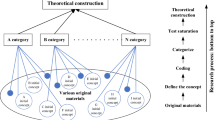Abstract
More akin to the Roman Empire’s concept of civitas mobilis augescens, the distinction between the twentieth-century metropolis and the Roman model of a city must be sought in the eminently biopolitical character of the modern-day post-metropolis, conceived by Hardt and Negri as the new hegemonic paradigm of production. As a result, the primacy of time over space has been established as the only possible way of measuring the proximity of (re)productive relationships: everything that can be converted into information is instantaneous and the value of goods depends not on the requirements of its production process but on the cost of its transportation. As a kind of Phenomenology of the Urban Spirit, this paper develops the main milestones in the historical unfolding of this Logic of the Absolute Urban Spirit.
Similar content being viewed by others
Notes
“άςγή. This concept marks the limit between myth and philosophy but a limit, as such, participates in the two fields it limits” (Cassirer 1998a, p. 17).
With increasingly greater regularity, the MIT Technology Review publishes news articles about robots that have learned by themselves (or are self-programmed to) to identify behaviors or patterns for which they were not initially programmed as well as about some robots that are made to interact with each other and, in order to optimize their communication, develop their own language which no human being can decipher.
References
Arendt H (2004) The origins of totalitarianism. Schocken Books, New York
Argan GC (1969) Proyecto y destino. Ediciones de la Biblioteca de la Universidad Central de Venezuela, Caracas
Argan GC (1987) Renacimiento y barroco. Vol 1, Ediciones Akal, Madrid
Armitage J (ed) (2001) Virilio live: selected interviews. SAGE, London
Cacciari M (1972) De la vanguardia a la metrópoli. Crítica radical a la arquitectura. Editorial GG, Madrid
Cacciari M (2009) La città. Pazzini Editore, Venice
Cacciari M (2011) La ciudad territorio (o la post-metrópoli). Arenas L, Fogué U (eds). Planos de (Inter) sección: materiales para un diálogo entre filosofía y arquitectura. Ricardo S. Lampreave editor, Madrid
Cassirer E (1998a) Filosofía de las formas simbólicas vol II. Fondo de cultura económica, México, D. F. (1953-1957). English edition: Philosophy of simbolic forms. Yale University Press, New Haven
Cassirer E (1998b) Filosofía de las formas simbólicas vol III. Fondo de cultura económica, México, D. F. (1953-1957). English edition: Philosophy of simbolic forms. Yale University Press, New Haven
Deleuze G, Guattari F (1980) Mil Plateaux (capitalisme et schizophrénie). Les Éditions de Minuit, Paris (1987). In: A thousand plateaus (Capitalism and Schizophrenia). Continuum, New York
Engels F (2013) El origen de la familia, la propiedad privada y el Estado. Alianza Editorial, Madrid (2010) In: Origin of the familiy, private property, and the state. https://www.marxists.org/archive/marx/works/download/pdf/origin_family.pdf. Accessed 6 Feb 2018
Foucault M (1986) Of other spaces. Diacritics 16(1):22–27
Foucault M (2005) Las Palabras y las Cosas. Una Arqueología de las Ciencias Humanas. Editorial Siglo XXI, Madrid (2002). In: The order of things. An archeology of the human sciencies. Routledge, New York
Foucault M (2006) Seguridad, territorio, población: curso en el Collège de France (1977-1978). Fondo de cultura económica, Buenos Aires (2009) Security. Territory. Population. Lectures at the Collège de France, 1977-1978. Palgrave macmillan, New York
Foucault M (2007) Nacimiento de la biopolítica: curso en el Collège de France (1978-1979). Fondo de cultura económica, Buenos Aires (2008) The Birth of Biopolitics. Lectures at the Collège de France, 1978-1979, Palgrave macmillan, New York
Kautsky K (1982) Parlamentarismo y democracia. Editora Nacional, Madrid
Marx K (1885) Capital volume II. The process of circulation of capital. http://www.marxists.org/archive/marx/works/1885-c2/ch12.htm. Accessed Feb 2018
Marx K (2001) El Capital vol III. Editorial Fondo de Cultura Económica, México D. F. (1885) Capital Volume III. https://www.marxists.org/archive/marx/works/1885-c2/index.htm. Accessed 6 Feb 2018
Mumford L (1977) Technics and civilization. Routledge & Kegan Paul LTD, London
Negri A (1991) Marx beyond marx: lessons on the grundrisse. Autonomedia, New York
Negri A (2006) Fábricas del sujeto. Ontología de la subversión. Akal, Madrid
Panofsky E (1999) La perspectiva como forma simbólica. Tusquets Editores, Barcelona (1991) Perspective as Symbolic Form. Zone Books, New York
Rossi A (1966) L’architettura della città. Gustavo Gili, Barcelona
Rossi A (1992) La arquitectura de la ciudad. Editorial Gustavo Gili, Barcelona (1982) The Architecture of the City. The MIT Press, Cambridge
Rowe C (1978) Collage city. The MIT Press, Cambridge
Schmitt C (2007) Tierra y mar. Una reflexión sobre la historia universal. Trotta, Madrid
Sloterdijk P (2003) Esferas II. Globos. Siruela, Madrid (2014) Globes: Spheres Volume II. Semiotext(e), Los Angeles
Sloterdijk P (2006) Esferas III. Espumas. Siruela, Madrid (2016) Foams. Spheres Volume III. Semiotext(e), Los Angeles
Tafuri M (1978) La arquitectura del humanismo. Xarait Ediciones, Barcelona
Virilio P (2006b) El accidente original. Amorrotu Editores, Buenos Aires (2007) The Original Accident. Policy Press, Cambridge
Virilio P (2010) The Futurism of the instant. Polity Press, Cambridge
Volpi F (2007) El poder de los elementos. Schmitt C. Tierra y mar. Una reflexión sobre la historia universal. Trotta, Madrid
Wittkower R (1979) Sobre la arquitectura en la edad del humanismo. Editorial Gustavo Gili, Barcelona (1949) Architectural Principles in the Age of Humanism. The Warburg Institute, London
Author information
Authors and Affiliations
Corresponding author
Ethics declarations
Conflict of interest
None of the authors has a conflict of interest.
Research Involving Human and Animal Participants
This article does not contain any studies with human participants or animals performed by any of the authors.
Rights and permissions
About this article
Cite this article
León Casero, J., Urabayen, J. THE POST-METROPOLIS IS GOD: Notes for a Phenomenology of the Urban Spirit. Topoi 40, 493–502 (2021). https://doi.org/10.1007/s11245-018-9590-0
Published:
Issue Date:
DOI: https://doi.org/10.1007/s11245-018-9590-0



